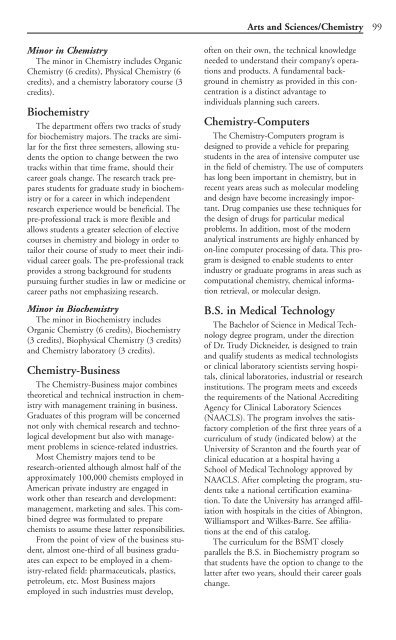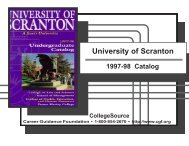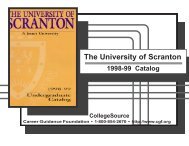2003-2004 - The University of Scranton
2003-2004 - The University of Scranton
2003-2004 - The University of Scranton
Create successful ePaper yourself
Turn your PDF publications into a flip-book with our unique Google optimized e-Paper software.
Minor in Chemistry<br />
<strong>The</strong> minor in Chemistry includes Organic<br />
Chemistry (6 credits), Physical Chemistry (6<br />
credits), and a chemistry laboratory course (3<br />
credits).<br />
Biochemistry<br />
<strong>The</strong> department <strong>of</strong>fers two tracks <strong>of</strong> study<br />
for biochemistry majors. <strong>The</strong> tracks are similar<br />
for the first three semesters, allowing students<br />
the option to change between the two<br />
tracks within that time frame, should their<br />
career goals change. <strong>The</strong> research track prepares<br />
students for graduate study in biochemistry<br />
or for a career in which independent<br />
research experience would be beneficial. <strong>The</strong><br />
pre-pr<strong>of</strong>essional track is more flexible and<br />
allows students a greater selection <strong>of</strong> elective<br />
courses in chemistry and biology in order to<br />
tailor their course <strong>of</strong> study to meet their individual<br />
career goals. <strong>The</strong> pre-pr<strong>of</strong>essional track<br />
provides a strong background for students<br />
pursuing further studies in law or medicine or<br />
career paths not emphasizing research.<br />
Minor in Biochemistry<br />
<strong>The</strong> minor in Biochemistry includes<br />
Organic Chemistry (6 credits), Biochemistry<br />
(3 credits), Biophysical Chemistry (3 credits)<br />
and Chemistry laboratory (3 credits).<br />
Chemistry-Business<br />
<strong>The</strong> Chemistry-Business major combines<br />
theoretical and technical instruction in chemistry<br />
with management training in business.<br />
Graduates <strong>of</strong> this program will be concerned<br />
not only with chemical research and technological<br />
development but also with management<br />
problems in science-related industries.<br />
Most Chemistry majors tend to be<br />
research-oriented although almost half <strong>of</strong> the<br />
approximately 100,000 chemists employed in<br />
American private industry are engaged in<br />
work other than research and development:<br />
management, marketing and sales. This combined<br />
degree was formulated to prepare<br />
chemists to assume these latter responsibilities.<br />
From the point <strong>of</strong> view <strong>of</strong> the business student,<br />
almost one-third <strong>of</strong> all business graduates<br />
can expect to be employed in a chemistry-related<br />
field: pharmaceuticals, plastics,<br />
petroleum, etc. Most Business majors<br />
employed in such industries must develop,<br />
Arts and Sciences/Chemistry 99<br />
<strong>of</strong>ten on their own, the technical knowledge<br />
needed to understand their company’s operations<br />
and products. A fundamental background<br />
in chemistry as provided in this concentration<br />
is a distinct advantage to<br />
individuals planning such careers.<br />
Chemistry-Computers<br />
<strong>The</strong> Chemistry-Computers program is<br />
designed to provide a vehicle for preparing<br />
students in the area <strong>of</strong> intensive computer use<br />
in the field <strong>of</strong> chemistry. <strong>The</strong> use <strong>of</strong> computers<br />
has long been important in chemistry, but in<br />
recent years areas such as molecular modeling<br />
and design have become increasingly important.<br />
Drug companies use these techniques for<br />
the design <strong>of</strong> drugs for particular medical<br />
problems. In addition, most <strong>of</strong> the modern<br />
analytical instruments are highly enhanced by<br />
on-line computer processing <strong>of</strong> data. This program<br />
is designed to enable students to enter<br />
industry or graduate programs in areas such as<br />
computational chemistry, chemical information<br />
retrieval, or molecular design.<br />
B.S. in Medical Technology<br />
<strong>The</strong> Bachelor <strong>of</strong> Science in Medical Technology<br />
degree program, under the direction<br />
<strong>of</strong> Dr. Trudy Dickneider, is designed to train<br />
and qualify students as medical technologists<br />
or clinical laboratory scientists serving hospitals,<br />
clinical laboratories, industrial or research<br />
institutions. <strong>The</strong> program meets and exceeds<br />
the requirements <strong>of</strong> the National Accrediting<br />
Agency for Clinical Laboratory Sciences<br />
(NAACLS). <strong>The</strong> program involves the satisfactory<br />
completion <strong>of</strong> the first three years <strong>of</strong> a<br />
curriculum <strong>of</strong> study (indicated below) at the<br />
<strong>University</strong> <strong>of</strong> <strong>Scranton</strong> and the fourth year <strong>of</strong><br />
clinical education at a hospital having a<br />
School <strong>of</strong> Medical Technology approved by<br />
NAACLS. After completing the program, students<br />
take a national certification examination.<br />
To date the <strong>University</strong> has arranged affiliation<br />
with hospitals in the cities <strong>of</strong> Abington,<br />
Williamsport and Wilkes-Barre. See affiliations<br />
at the end <strong>of</strong> this catalog.<br />
<strong>The</strong> curriculum for the BSMT closely<br />
parallels the B.S. in Biochemistry program so<br />
that students have the option to change to the<br />
latter after two years, should their career goals<br />
change.
















